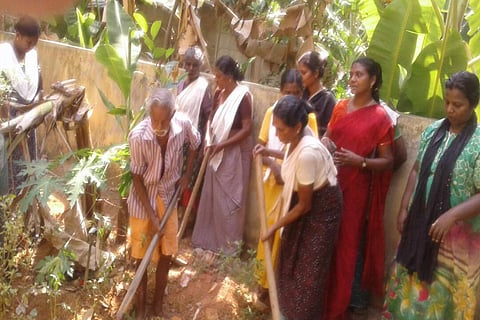

While contesting the Assembly election in 2016, IB Satheesh, MLA of Kattakada had promised voters in the constituency that he will envisage a project to address the water crisis, within two years. He held meetings to discuss measures for restoration of the Neyyar river, which had dried up in the summer and turned into an open ground.
In July last year, a convergence meeting of the officials of Water Resources department, Agriculture, Soil Conversation, Mahatma Gandhi National Rural Employment Guarantee Scheme, Bio Diversity Board, Education department and Jalanidhi Board was held.
The legislator kept his promise and came up with ‘Vattatha Uravaykkay Jalasamrudhi’ (water abundance for living stream), an ambitious project to tackle water scarcity by conserving water. Launched on World Water Day on March 22, the first step was to ensure participation of people to implement it irrespective of political affiliations. The focus of Jalasamrudhi was also to raise the groundwater level. For this, rain pits were dug in all wards of the constituency. People, activists of the youth wing of three major political parties- CPI (M), Congress and BJP, and Kudumbashree workers volunteered for the task.
Speaking to The News Minute, Kerala State Land Use Board Commissioner A Nizamudeen said, “In the houses where rain pits were dug, there is sufficient water now. That pits have stored the water from the summer rain. Now these people want rain pits to be dug adjacent to wells in all houses. In all the six panchayats in the constituency, there is a general awareness now about groundwater recharging. The people are voluntarily digging rain pits in houses without funding from panchayats.”
There are six panchayats in the constituency: Kattakada, Maranalloor, Malayinkeezh, Pallichal, Vilappil and Vilavoorkal. In each ward of a panchayat, more than 100 rain pits have been dug voluntarily. “In a pit with a depth, width and height of one metre, 300 litres of water can be stored. If rain is received for 100 days in a year, the water stored will be sufficient for a year. On an average, there are 10000 houses in a panchayat. If there is one rain pit dug in all houses, there will not be any water crisis,” Nizamudeen said.
"Modalities have been worked out to implement well recharging in Pallichal and Kattakada panchayats through MGNREGS. Catchment of six ponds in the constituency will be protected using coir geotextile for which field estimates have been taken by National Coir Research Institute. State Ground Water Department will demonstrate artificial recharging in selected schools in the constituency. A separate project is in the pipeline for the reuse of used water, which will be executed in Malayinkeezhu school," he said.
‘Jalasamrduhi’ is the first comprehensive project of its kind in the state. Chief Minister Pinarayi Vijayan on Wednesday told the Assembly that it will be adopted in the rest of the panchayats across the state. "Wells are the major source of water in the constituency. By digging rain pits and diverting the water stored in it to wells, water could be retained on earth. Also groundwater level could be raised,” Nizamudeen said.
Planting of Trees
Sasikala, chairperson of Kudumbashree Malayinkeezh Community Development Society, Kattakda, said that it was the awareness that water is as important as life which prompted Kudumbashree workers to dig rain pits voluntarily. “The change has to come from ourselves rather than the authorities,” she said. As a part of 'Jalasamrudhi', trees have been planted in all six panchayats. Workers of the women’s group Kudumbashree have planted 20,000 trees and are also assisting people in planting trees at home.
Thirty per cent of the people of Kattakada, located in the boundary of Karamana and Neyyar rivers are using piped water whereas the rest 70% are taking water from conventional sources like well and ponds.
“As a part of the project, ward level survey was done on how many conventional water sources are there and what action could be taken to revive them. There are 314 ponds in the constituency. A comprehensive resource map was also prepared, which could perhaps be the first of its kind in the state,” Satheesh told TNM.
Water Quality Test
There are in total 68 Upper Primary and High Schools in the constituency and training was given for teachers and students of ‘water clubs’ in the constituency to conduct water quality test. “The test checking the quality of water in the wells, ponds and pipelines is being conducted in all the 122 wards in the constituency. It will be completed before school reopening. The concept is to examine whether the water is contaminated or not,” Satheesh said.
He added, “The most important thing was to introduce the concept of water literacy. Pamphlets were distributed in all houses on how to reduce the use of water. A 15-item action plan was prepared for conserving water”.
Each year there has been a dip in the groundwater level, which is also common across the state as per the data of the Ground Water Department. In Kattakada also, a dip of two to four metres has been recorded last year. Nemom Block Panchayat in Kattakada comes under the semi-critical category of water availability.
Kerala has been witnessing the worst drought in 115 years. The state government had declared Kerala a drought-hit state in October last year after the initial monsoon failure.
“I have seen that a pond of two acre square feet has been dried up and has been converted into a playground now. I don’t want this to happen in the future. With Jalasamrudhi, we hope that Kattakada will not have to face a drought from next year and with similar models, water won’t be scarce for any panchayat in the state,” Satheesh said.